“Therein lies both the charm and the value of this book, sympathetic story-telling grounded in primary documents, liberally quoted to keep the reader as close as possible to the words and experiences of those who worked and travelled the York Factory Express.” – BC Studies
This entry was posted
on Friday, July 22nd, 2022 at 4:58 pm and is filed under
Blog.
Next up in our new series on Ronsdale authors and what they love to read are Nancy Dyson and Dan Rubenstein.
Dan and Nacy are co-authors of Ronsdale publication ‘Railroad of Courage’. Dan Rubenstein’s interest in runaway slaves began when he attended a school in an old house which had been part of the Underground Railroad. Dan is a geographer, environmentalist and writer. For more info visit www.rubenstein-dyson.com. Nancy Dyson studied international development at Vassar College and was deeply concerned about issues of inequality. Later she became an early childhood educator with a special interest in children’s literature. For more info visit www.rubenstein-dyson.com. Both Dan and Nancy live in Gloucester, Ontario.
We asked Nancy and Dan what inspiration their bookshelves have held over the years and influenced their own writing…
Nancy
To choose my favourite book is a daunting task! I love to read and I’m thankful for public libraries. I usually have two or three books on the go.
What I love are…
- The classics. I love good stories that are well told, like books by Dickens, Tolstoy, Hemingway, Joseph Conrad, Faulkner and many others. I have read and re-read For Whom the Bell Tolls and I am always moved by the beauty of the language.
- Canadian writers like Margaret Laurence, Carol Shields, Alice Munro and Richard Wagamese who explore human complexity through the lives of ordinary people. I love The Diviners.
- Non-fiction. I have just finished reading several works by Adam Hochschild, a historian who focuses on social justice issues. Spain in Our Hearts is a wonderful account of the Spanish Civil War.
- Children’s literature. What can be better than sharing a good story with a child, exploring the world through the pages of a book?

Dan
I did not start reading until grade five but then I made up for lost time. Right from the start, my reading tastes were eclectic, ranging from classics such as Treasure Island, to non-fiction books like the Microbe Hunters. Like many other boys in the 1950’s, I burned through the Hardy Boys series, eagerly awaiting the next book. My parents were both professors and I had access to a wonderful library at Vassar College. I loved going to library and wandering through the stacks, finding books on whim.
Now my tastes are still eclectic ranging from non-fiction such as Charlotte Gray’s account of the gold rush, Gold Diggers, to classic fiction like Typhoon by Joseph Conrad.
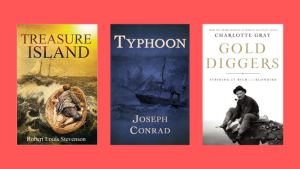
We hope you enjoyed reading about some of Dan and Nancy’s favourite novels! Follow our social media to keep up with our Authors’ Inspirations Series.
Facebook: @ronsdalepress
Instagram: @ronsdalepress
Twitter: @ronsdalepress
Buy Railroad of Courage here: http://ronsdalepress.com/books/railroad-of-courage/
About Railroad of Courage:
Born on a cotton plantation in South Carolina, twelve-year-old Rebecca knows only slavery. But when Grower Brown decides to sell her father to a plantation downriver, Rebecca convinces her parents to run away with her on the Underground Railroad to Canada. Led by the famous Harriet “Moses” Tubman, the family hides in coffins, rides a handmade raft through alligator-infested waters, and pumps hand cars across Illinois amidst a blizzard. Escaping federal marshals and bounty hunters isn’t easy, but with the help of freed slaves and abolitionists, Rebecca learns there is more to the world than slavery. Even in challenging moments, she finds courage by reminding herself: “I want to live in freedom. I am travelling from midnight to dawn and I won’t stop until I see the sunrise.”
To watch Nancy & Dan read from Railroad of Courage click here: https://www.youtube.com/watch?v=9dEEbYjqIs4
This entry was posted
on Monday, April 13th, 2020 at 10:55 am and is filed under
Blog.
Next up in our new series on Ronsdale authors and what they love to read is Maia Caron.
Maia Caron is the author of Ronsdale publication ‘Song of Batoche’. Her extended Caron, Dumas, and Parenteau family were among the founders of Batoche, Saskatchewan. They fought with Louis Riel and Gabriel Dumont during the North-West Resistance of 1885. Maia is a member of the Métis Nation of Ontario and lives in Toronto. Song of Batoche is her first novel. For more information, please visit her website at www.maiacaron.com. Or follow her on Twitter @MaiaCaron.
We asked Maia what inspiration her bookshelf has held over the years and influenced her own writing…
I’ve treasured many books over the years, but the following four novels occupy pride of place on my bedroom bookshelf. This is not because they’re fun, uplifting stories, but because they broke my heart with their honesty and vivid characters who fought for love. These stories were revelations. They had me from their first lines, stripping away artifice and laying bare the human spirit. They inspired me to write stories that might move readers the same way.
The first is Charles Frazier’s Cold Mountain.
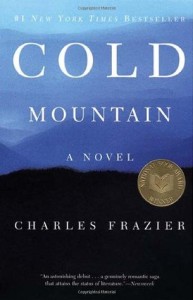
This tragic love story has an Odyssean journey at its heart.
The Diviners by Margaret Laurence is my next choice.
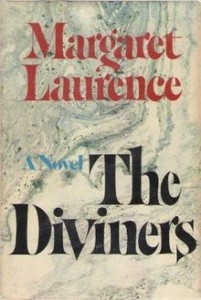
It features the brave, before-its-time honesty of a woman attempting to find her way while laying bare her fears and broken dreams.
Anne-Marie Macdonald’s Fall on Your Knees is third on my list.
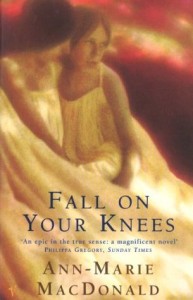
I consider this raw epic saga of a dysfunctional Cape Breton family a classic of Canadian literature.
Last but not least is Gilead by Marilynne Robinson.
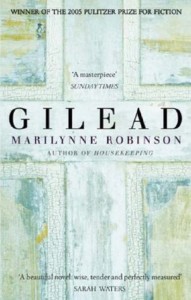
This novel reveals the world’s heartbreaking natural beauty from a dying father’s eyes. It inspires me by how it spoke so keenly of love.
We hope you enjoyed reading about some of Maia’s favourite novels! Follow our social media to keep up with our Authors’ Inspirations Series.
Facebook: @ronsdalepress
Instagram: @ronsdalepress
Twitter: @ronsdalepress
Buy Song of Batoche here: http://ronsdalepress.com/books/song-of-batoche/
Song of Batoche Description:
Louis Riel arrives at Batoche in 1884 to help the Métis fight for their lands and discovers that the rebellious outsider Josette Lavoie is a granddaughter of the famous chief Big Bear, whom he needs as an ally. But Josette learns of Riel’s hidden agenda — to establish a separate state with his new church at its head — and refuses to help him. Only when the great Gabriel Dumont promises her that he will not let Riel fail does she agree to join the cause.
In this raw wilderness on the brink of change, the lives of seven unforgettable characters converge, each one with secrets: Louis Riel and his tortured wife Marguerite; a duplicitous Catholic priest; Gabriel Dumont and his dying wife Madeleine; a Hudson’s Bay Company spy; and the enigmatic Josette Lavoie. As the Dominion Army marches on Batoche, Josette and Gabriel must manage Riel’s escalating religious fanaticism and a growing attraction to each other. Song of Batoche is a timeless story that traces the borderlines of faith and reason, obsession and madness, betrayal and love.
This entry was posted
on Sunday, March 15th, 2020 at 4:35 pm and is filed under
Blog.
Louise is the subject of our recent publication ‘Moon Madness: Dr. Louise Aall, Sixty Years of Healing in Africa’ by Alan Twigg.
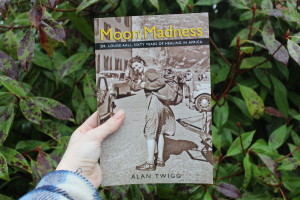
March 8th 2020 marks this year’s International Women’s Day. The theme for this year is #eachforequal, calling for an “enabled world by being an equal world”, where women’s skills are valued. With that in mind, we look today to one of our books that includes a woman of strong skill and character. Without Dr. Louise Aall’s contributions to epilepsy research and treatment, this world would be less enabled. Today, we call for women to be taken in equal standing as men.
There are two quotes at the beginning of Louise’s biography. The first is one by the Dalai Lama, describing the infinite ability of those with courage. The second is about self-sacrifice; how it allows one to transcend the pleasure of a self-indulgent life (by Leo Tolstoy). These two traits – courage and self-sacrifice – capture Dr. Louise All’s character perfectly.
In 1959 Louise travelled as a solo physician in East Africa, where she discovered that epilepsy was rampant in the area of Tanganyika – with an incidence rate that was ten times higher than the global norm. Known as kifafa in Swahili (meaning Moon Madness), it had become a social epidemic, whereby epileptics were outcasts. Often, they were thrown out from their own homes. Their family members were disgraced, unable to marry ‘regular’ villagers. Louise was told, by the medical establishment, that there was no effective way to treat it.
She proved the establishment wrong, however, setting up a clinic in Manhenge, Tanzania, to treat patients with epilepsy. For the past sixty years she has maintained this clinic, even while living in Tsawwassen, B.C. The clinic isn’t Louise’s only accomplishment – not by a long shot. She was awarded a Red Cross medal in 1960, when she bravely went to a 300-bed hospital in the Belgian Congo, serving as the lone attending physician during the civil war. She assisted Novel Peace Prize Laureate Dr. Albert Shweitzer at his jungle clinic in Gabon, as she gained impressive knowledge on treating tropical diseases during her time in the Belgian Congo. She has also worked with the First Nations of Canada, as a psychiatrist and anthropologist.
Louise didn’t allow the fact that she was a woman to hold her back from her career, at a time when sexism was even more rampant than it is today. She often sacrificed socialising and company (having the potential to damage her reputation and threaten her safety), for a cause that she believed in. She is an embodiment of the spirit that International Women’s Day celebrates. Today, let every woman use her voice and ability to her full potential, as Louise has done.
Read more about Dr. Louise Aall in ‘Moon Madness: Dr. Louise Aall, Sixty Years of Healing in Africa’ by Alan Twigg: http://ronsdalepress.com/moon-madness/
This entry was posted
on Sunday, March 8th, 2020 at 12:58 pm and is filed under
Blog.
Welcome to a new blog series at Ronsdale Press! We’ve asked some of our authors what books have most inspired them, and therefore their own work, over time. First up is Marie Elliott.
Marie Elliott is the author of Ronsdale publication, ‘Gold in British Columbia’. She has also written numerous articles and is author of two definitive books about British Columbia’s interior: ‘Gold and Grand Dreams’ (2000) and ‘Fort St. James and New Caledonia: Where British Columbia Began’ (2009). Her great-great-grandfather, William Collinson, took part in the Cariboo Gold Rush.
Below, Elliott discusses the three books she cites as being her greatest literary inspiration…
The first of my inspirations is The Man for a New Country by Sir Matthew Baillie Begbie by David R. Williams.
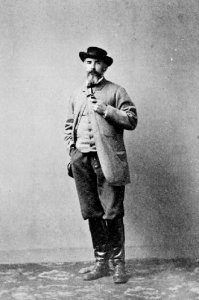
How do you manage law and order in the face of an onslaught of 2,000 gold miners
eager to find instant wealth? How will an equal number of Aboriginal people keep their homes and livelihood when these prospectors move into their territory? How do you adapt British laws to a new Colony?
David R. William’s biography of Sir Matthew Baillie Begbie sets down in great detail how the Judge accomplished his tasks. We learn that Begbie had a keen intelligence, raw courage to face the unknown and compassion for both Aboriginals and white settlers. For example, his efforts to introduce a law that would provide income for abandoned wives and children is not well known.
The author, David Williams, was a lawyer, appointed Queen’s Counsel in 1969. His fine analyses of Begbie’s decisions in the province’s most complicated legal cases make the book an outstanding historical reference as well as an enjoyable read.
Next on my list is The Judge’s Wife: Memoirs of a British Columbia Pioneer by Eunice M.L. Harrison.
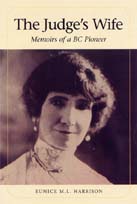
How many of us take the time to maintain diaries these days? While keeping up with modern technology in the twentieth century, it is reassuring to take an hour or two from a hectic day and read a few chapters of The Judge’s Wife. Eunice Harrison’s memoirs take us back in time to the end of the 19th century when life moved at a slower pace. For over half a century she recorded her activities in multiple notebooks, and at the age of 85, with the help of her youngest son, Herschel, she recreated her life story using the notebooks for reference.
Eunice was born into the adventurous Seabrook family in Ontario. Her father came west to visit the gold fields and returned to bring his young family out to British Columbia. In 1880 Eunice married Eli Harrison Jr., whose family was from England. After Harrison was called to the British Columbia Bar in 1884, he took over some of the court circuit duties in the Interior that Matthew Baillie Begbie had covered. Begbie attended the same Victoria church as the Harrisons, St. John the Divine, and was a welcome visitor at their home.
With a decent upper middle-class income, Eunice maintained all the niceties of society, while raising six children with the help of servants. She spent most of her life in Victoria but had enjoyed visits to Vancouver as a teenager. She later accompanied her husband on a circuit in the Cariboo.
In order to cope with a bout of arthritis, Eunice went to San Francisco in 1906 with her two youngest children. They were staying in the St. Nicholas Hotel when a mighty earthquake destroyed the city. The ingenuity used by the family to make their way out of the hotel and down through mangled crowds to a waiting passenger ship forms the climax of Eunice’s life story.
The book is produced by Ronsdale Press with great care and attention, including sensitive editing by Ronald Hatch, a fine introduction by Jean Barman, and a detailed set of Notes compiled by Louise Wilson, Eunice’s granddaughter. It should be an inspiration to any readers who have said to themselves, “Oh, I must write that down before I forget. Time is passing by so quickly!”
Buy The Judge’s Wife: Memoirs of a British Columbia Pioneer: https://ronsdalepress.com/books/the-judges-wife/
Last on my list of greatest literary inspirations is British Columbia Coast Names: Their Origin and History by Captain John T. Walbran.
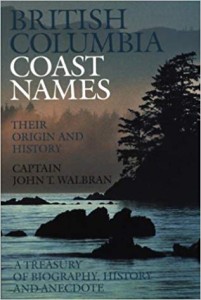
This is a very special book for me, for two reasons. The author, Captain Walbran, was a personal friend of my great, great grandfather, William Collinson, a pioneer settler and postmaster who lived at the head of the wharf at Miners Bay, Mayne Island. Both men were from Yorkshire, and over a period of ten years, whenever Walbran brought the lighthouse tender, Quadra, to service the Georgina Point lighthouse at Mayne, he took time to visit with my great, great, grandfather and learn more about the history of the area. The information he obtained appears in the book’s entries for the Gulf Islands.
Walbran continued to gather stories at stops up and down the British Columbia coast until his retirement. In port he spent his spare time researching at libraries and archives to enlarge and verify his data. He was an excellent photographer and sent his hosts images at Christmas which are treasured by many coastal families.
British Columbia Coast Names sold out immediately when it was published in 1909. It was first reprinted by the Vancouver Public Library in 1971, and my copy shows two more reprintings in 1971 and 1973. It is a book that belongs on everyone’s reference shelf.
We hope you enjoyed seeing some of the inspiration behind an author’s work! We will continue to share those of Ronsdale-published authors.
Buy ‘Gold in British Columbia’ here: http://ronsdalepress.com/books/gold-in-british-columbia/
‘Gold in British Columbia’ Description:
The Fraser River and Cariboo gold rushes were defining moments, not only in the history of British Columbia, but also Canada. With the influx of over 25,000 European and Chinese miners to the Fraser River in the spring of 1858, all of them hungry for gold, the British government was compelled to declare the mainland, known then as New Caledonia, the Colony of British Columbia. Thirteen years later the colony would join Confederation, assuring that the country would reach from sea to sea. In an attempt to capture the excitement of this period and the challenges faced by the colonial government during the years prior to Confederation, Gold in British Columbia seeks to answer three vital questions: How did the two gold rushes unfold? Who were the participants? And what were the outcomes? Excerpts from the correspondence of government officials and from Matthew Baillie Begbie, the only Supreme Court judge in the Colony of British Columbia for most of that period, provide insight, humour and new perspectives on the actual gold rush events and the enormous task of establishing law and order during one of the major social upheavals of North America. In this history, readers will meet the miners, First Nations peoples, Hudson’s Bay Company personnel, governors, Royal Engineers, assistant gold commissioners, steadfast community leaders, and brave women who trekked over the mountains — a kaleidoscope of colourful people and events.
This entry was posted
on Friday, March 6th, 2020 at 1:26 pm and is filed under
Blog.
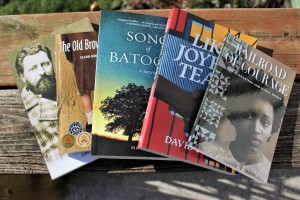
Intellectual freedom is a guaranteed right to Canadian citizens and one that should never be taken for granted. Even though book censorship still occurs, it’s a tiny rate compared to other eras throughout history and in other parts of the world. Today, we bring attention to periods and places when knowledge was a restricted tool. By understanding and acknowledging these moments throughout history, we gain a greater appreciation of the freedom we have. To do this, we recommend the following books.
1. ‘The Railroad of Courage’ by Dan Rubenstein and Nancy Dyson
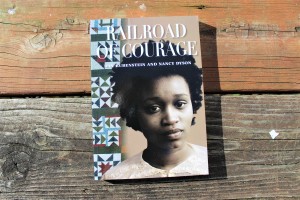
Born on a cotton plantation in South Carolina, twelve-year-old Rebecca knows only slavery. When Grower Brown decides to sell her father to a plantation downriver, Rebecca convinces her parents to run away with her on the Underground Railroad to Canada. Led by the famous Harriet “Moses” Tubman, the family hides in coffins, rides a handmade raft through alligator-infested waters, and pumps hand cars across Illinois amidst a blizzard.
As slaves, Rebecca and her family were not allowed to read or write. In the passage below, a compassionate abolitionist teaches Rebecca and her mother the literacy skills they never received on the plantation.
Missus Barrier laid some books on a table. We stood beside her and watched as she pointed to a picture, then a word, then back to the picture. Then she asked us to try. My ma took some encouragement, but I could do it easily. I was eager to learn the alphabet, too. What would it be like to open a book and understand all the words written inside? I asked Missus Barrier, “Are the letters and words the same for white people and black people?”
She laughed, “Yes, Rebecca, they’re the same for all of us. When you learn to read, it doesn’t matter what colour your skin is. Your mind will be free to imagine anything you wish, to fly up into the clouds or travel around the world. I think you’ll love being able to read. It’ll be harder for you, Deborah, because you’re older, but you’ll learn. Don’t worry.”
Missus Barrier came every afternoon, and in the evening, I practised words, over and over. I printed out the letters and traced them. I closed my eyes, trying to remember their shape. One day I asked Missus Barrier to show me the letters in my name.
She printed out the letters of my name, “R E B E C C A.” That night I wrote my name in a small book Missus Carpenter gave me. I was proud as I traced the letters carefully and said my name out loud. Someday I would write a letter to Miss Clarissa and tell her everything that had happened since I ran away from the plantation.
Buy Railroad of Courage: https://ronsdalepress.com/books/railroad-of-courage/
2. ‘Louis Riel: Let Justice Be Done’ by David Doyle
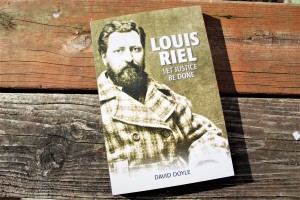
Louis Riel, prophet of the new world and founder of the Canadian province of Manitoba, challenged Canadian politics, history and religion since the early years of Confederation. In Canada’s most important and controversial state trial, Riel was found guilty of “high treason,” sentenced to hang and executed on November 16, 1885. Was the execution of Riel the hanging of a traitor? Or the legal murder of a patriot and statesman?
During his trial, Riel was forbidden to speak in court and was unable to defend himself against his charges. Any trace of his testimony was censored by those who wished to silence him. Here, now, weaving together Riel’s words, writing, and historical research, David Doyle provides Louis Riel with the opportunity for the first time to give his evidence and assume his proper place in Canada’s history.
Buy Louis Riel: Let Justice Be Done: https://ronsdalepress.com/books/louis-riel/
3. ‘Song of Batoche’ by Maia Caron
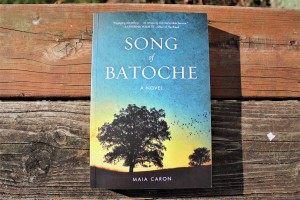
In another volume based on Louis Riel, Song of Batoche features raw wilderness on the brink of change. It centres around the lives of seven unforgettable characters as they converge, each one with secrets: Louis Riel and his tortured wife Marguerite; a duplicitous Catholic priest; Gabriel Dumont and his dying wife Madeleine; a Hudson’s Bay Company spy; and the enigmatic Josette Lavoie — granddaughter of the famous chief Big Bear, whom Riel needs as an ally. As the Dominion Army marches on Batoche, Josette and Gabriel must manage Riel’s escalating religious fanaticism and a growing attraction to each other. Song of Batoche is a timeless story that traces the borderlines of faith and reason, obsession and madness, betrayal and love.
Song of Batoche is set during a time and place where only men were given books, pencils, and paper. The rebellious Josette not only contravenes this notion herself, she inspires other women to consider the possibility of literacy. In the passage below, Josette attempts to discuss reading with Louis Riel’s wife Marguerite, who has just arrived in Batoche with Riel.
“Did you bring books?”
Marguerite looked down, confused. “Louis has brought some.”
Josette’s eyes came alive for the first time. “Which ones have you read?”
“Women do not read.” It was for men to do the thoughts and read the words. Then an awful thing occurred to her. Women in the Saskatchewan could read. And write. She felt she could not breathe, that she was too much under the eyes of those who saw her as a country simpleton.
Buy Song of Batoche: http://ronsdalepress.com/books/song-of-batoche/
4. ‘The Old Brown Suitcase’ by Lillian Boraks-Nemetz
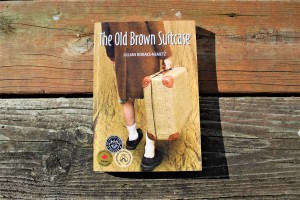
This novel narrates the absorbing story of a young girl who survived the Holocaust against all odds. At age fourteen, Slava comes to Canada with her parents and sister and a suitcase filled with memories of a lost childhood, memories that now haunt her new life. She cannot forget the hunger, stench and disease in the Warsaw Ghetto, nor the fear and humiliation of being incarcerated behind a high brick wall.
Slava’s story in The Old Brown Suitcase reminds us to never forget the horrors of the Holocaust while continuing to be vigilant about defending our guaranteed rights.
Buy The Old Brown Suitcase: http://ronsdalepress.com/books/the-old-brown-suitcase/
5. ‘Like Joyful Tears’ by David Starr
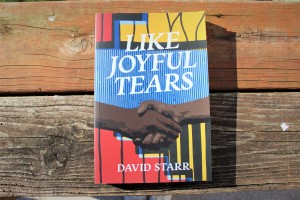
This is a gripping novel, set in east Africa, about two women forced to navigate a broken refugee system in a human crisis the world has forgotten. Victoria Deng was sixteen when her school was attacked during the Second Sudanese Civil War. Only Victoria and her sister Mary survived. Rescued by rebel soldiers shepherding hundreds of children across the desert to a refugee camp. Twenty years later, restless Vancouver student Abena Walker flies to Ukiwa Refugee Camp in Kenya as a teacher. There, while teaching Victoria’s two children, Abena learns that the family will soon be in grave danger. She resolves to defy camp rules and help them immigrate to Canada and reunite with Victoria’s sister. Outwitting the system will risk both their lives.
In the Ukiwa Refugee Camp, some parents do not allow their children to attend the camp-operated schools, out of fear and suspicion of Western teaching. In Like Joyful Tears, a mother and her two children risk the possible backlash from their abusive father and sneak into the camp school to learn how to read and write.
Buy Like Joyful Tears: https://ronsdalepress.com/like-joyful-tears/
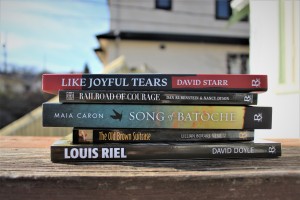
This entry was posted
on Thursday, February 27th, 2020 at 11:08 am and is filed under
Blog.




















